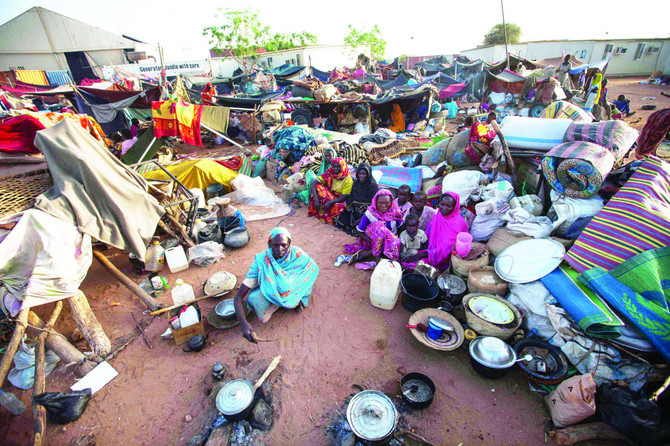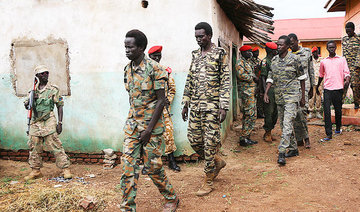KHARTOUM: Sudanese President Omar Bashir said Monday it was time to shut camps hosting hundreds of thousands of displaced people from the conflict in Darfur as the war in the region had ended.
Bashir, wanted by The Hague-based International Criminal Court for genocide and war crimes related to the Darfur conflict, said internally displaced people (IDP) should return to their villages and not stay in camps anymore.
“Darfur has now recovered, and the next step is to empty the IDP camps as we don’t want any more IDPs,” Bashir said in a speech at a youth convention in Khartoum.
“IDPs and refugees have to return to their villages. We will provide security and services to their villages.”
Bashir alleged that the IDP camps had become business ventures for foreign aid groups.
“They come and offer humanitarian aid, take pictures of our people to get donations and then take 80 percent of these donations themselves,” he said, without naming any aid organization.
“They are investing in the suffering of our people and doing business in the name of helping IDPs.”
Bashir has regularly criticized foreign aid organizations, and in 2009 he expelled several that were operating in Darfur.
The UN said in October that about 3 million people in Darfur needed aid, of whom nearly 1.6 million lived in 60 camps.
“A lack of basic services and infrastructure in addition to insecurity in some areas continues to prevent the return of displaced people to their areas of origin,” the UN Office for the Coordination of Humanitarian Affairs, or OCHA, said in a recent report.
Sudanese officials including Bashir say that the war in Darfur has ended, and have consistently demanded that the UN peacekeeping force deployed in the region be disbanded.
Earlier this year, the UN Security Council approved a reduction in the number of peacekeeping forces, citing an overall fall in violence in Darfur.
Although there has been a significant reduction in violence, deadly tribal clashes still occur in Darfur, a region the size of France.
The conflict in Darfur broke out in 2003 when ethnic minority rebels took up arms against Bashir’s Arab-dominated government, accusing it of marginalizing the region economically and politically.
The UN says the conflict has killed about 300,000 people and displaced more than 2.5 million, most of whom still live in large camps.
Bashir steadfastly denies committing war crimes and genocide in Darfur.
Bashir says time to empty camps of Darfur displaced
Bashir says time to empty camps of Darfur displaced

US condemns RSF drone attack on World Food Programme convoy in Sudan’s North Kordofan

- Denise Brown, the UN Humanitarian Coordinator for Sudan, also expresses concern over the drone attack
WASHINGTON: The US has condemned a drone attack by Rapid Support Forces on an aid convoy in Sudan’s North Kordofan state that killed one person and injured three others.
“The United States condemns the recent drone attack on a World Food Program convoy in North Kordofan transporting food to famine-stricken people which killed one and wounded many others,” US Senior Adviser for Arab and African Affairs Massad Boulos wrote on X.
“Destroying food intended for people in need and killing humanitarian workers is sickening,” the US envoy wrote.
“The Trump Administration has zero tolerance for this destruction of life and of U.S.-funded assistance; we demand accountability and extend our condolences to all those affected by these inexcusable events and terrible war,” he added.
The Sudan Doctors Network said the convoy was struck by RSF drones in the Allah Karim area as it headed toward displaced people in El-Obeid, the state capital, Anadolu Agency reported.
The network described the attack as a “clear violation of international humanitarian law,” warning that it undermines efforts to deliver life-saving aid to civilians amid worsening humanitarian conditions across the country.
There was no immediate comment from the rebel group.
The United States condemns the recent drone attack on a World Food Program convoy in North Kordofan transporting food to famine-stricken people which killed one and wounded many others. This follows an attack earlier this week in Blue Nile state that injured a @WFP staff member.…
— U.S. Senior Advisor for Arab and African Affairs (@US_SrAdvisorAF) February 6, 2026
Denise Brown, the UN Humanitarian Coordinator for Sudan, in a statement also expressed concern over the drone attack which hit the aid trucks in North Kordofan.
“I am deeply concerned by a drone attack earlier today on trucks contracted by the World Food Programme (WFP) in North Kordofan, the aftermath of which I came across a few hours later, as I left the state capital, El Obeid.”
“The trucks were en route from Kosti to deliver life-saving food assistance to displaced families near El Obeid when they were struck, tragically killing at least one individual and injuring many more. The trucks caught fire, destroying food commodities intended for life-saving humanitarian response.”
Brown added that “Humanitarian personnel, assets and supplies must be protected at all times. Attacks on aid operations undermine efforts to reach people facing hunger and displacement.”
“Safe and unimpeded humanitarian access remains critical to ensure assistance reaches the most vulnerable people across Sudan.”
Since April 2023, the conflict between Sudan’s army and the paramilitary forces has killed tens of thousands, displaced 11 million and which the UN has described as one of the world’s worst humanitarian crises.
An alert issued by the Integrated Food Security Phase Classification (IPC), confirmed famine conditions in El-Fasher and Kadugli, the capital of South Kordofan, about 800 kilometers to the east.
The IPC said that 20 more areas in Sudan’s Darfur and neighboring Kordofan were at risk of famine.
Of Sudan’s 18 states, the RSF controls all five states in the western Darfur region, except for parts of North Darfur that remain under army control. The army holds most areas of the remaining 13 states across the south, north, east and center of the country, including the capital, Khartoum.
The conflict between the army and the RSF, which erupted in April 2023, has killed thousands of people and displaced millions.














